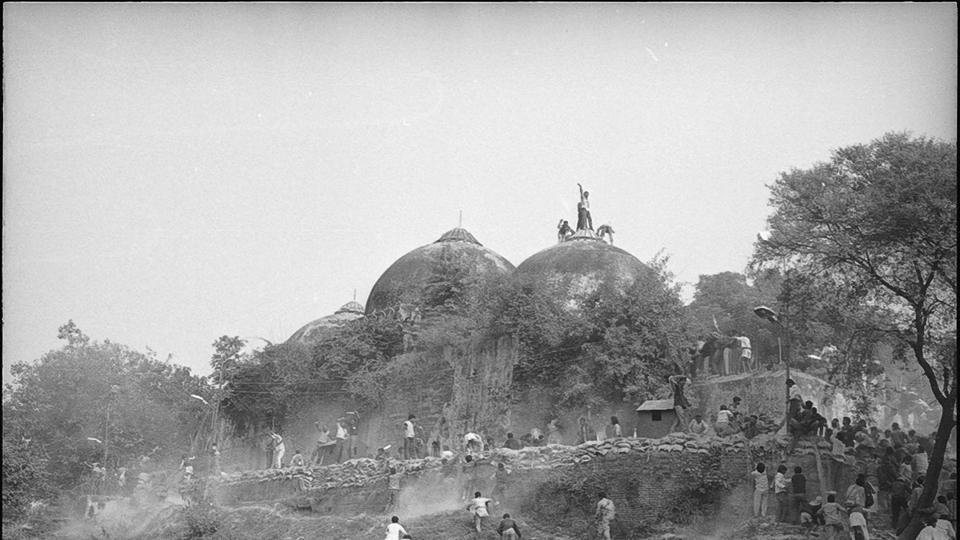New twist to Babri Masjid litigation: Shia Board lays claim after 71 years
With UP Shia Central Waqf Board filing affidavit in the Babri Masjid-Ramjanmabhoomi litigation in the Supreme Court, the issue is all set to take a ticklish and hostile turn in Muslim community. This is for the first time after 71 years that the Shia board has once again decided to lay claim on the property. The special bench of the apex court is scheduled to start hearing from August 11. Shia board intervention seems to be a political game for certain inexplicable reasons.
In a judgement by civil judge Faizabad SA Ahsan on March 30 1946, the Shia community had lost property right to Sunni community and thereafter Babri Masjid had permanently gone to UP Sunni Waqf Board, which is now the main litigant/claimant of the property in the present case also.
Even as the Babri Masjid file had been gathering dust in shelves of Shia board for the past seven decades, the VHP/others repeatedly in the past asserted that it was a Shia mosque and Sunni board had no rightful claim. However neither Shia board nor the community was willing to confront the Sunnis on the issue to further precipitate the strained relation between the two communities. It may be recalled that during Mayawati regime (2007-12) one of the members of the Shia b oard, who is now in BJP had dusted out the file and wanted to legally join the issue in the court but the then chairman did not allow. Some Shia clerics of Lucknow had also then opposed any such move, as they had already deposed in favour of the Sunni board in the High Court.
oard, who is now in BJP had dusted out the file and wanted to legally join the issue in the court but the then chairman did not allow. Some Shia clerics of Lucknow had also then opposed any such move, as they had already deposed in favour of the Sunni board in the High Court.
It may be recalled that in Faizabad lower court there was long drawn litigation over who constructed the mosque—Babar or his Faizabad Governor Mir Abdul Baqi Isfahani and whether Baqi, an Iranian from Isfahan, was Shia or a Sunni. Prominent legal expert AG Noorani had dealt with this issue in detail in his book Babri Masjid- 1528-2003. Through the pedigree (family tree) of Mir Baqi and other evidences, the court had thus concluded “I therefore hold that the evidence in this proves Abdul Baqi was a Shia”. But the mosque was proved to be a Sunni mosque on the basis of possession and two inscriptions found inside the mosque. While the first Persian inscription read: “by the order of Shah Babur, whose justice went to the skies, Amir Mir Baqi of lofty grandeur built this resting for mosque in 923 Hijiri (1528)”. But the second inscription describes Mir Baqi of Isfahan has an advisor of Babur and the builder of the mosque. Thus relying on the first inscription and history of Sunnis who offered the prayers, the court said “these facts are strongly suggestive of the fact that the founder of the mosque was a sunni”. The huge waqf properties attached to the mosque were always under the control of Baqi’s family as Mutawwalis. Babur had given letter of Waqf properties for the maintenance of the mosque in the name of Mir Baqi.
According to records both Sunni and Shias used to offer prayer at the mosque. Abdi Shias, who resided around the mosque before the partition offered prayer in the mosque. Most of them later migrated to Pakistan.
After the court decision in 1946, there is no evidence that Shia Waqf Board challenged the lower court order in any upper court. Since it was a period of extreme political upheaval– partition, and thereafter large Shia migration from Faizabad-Ayodhya to Pakistan, the issue was lost in the din. But immediately after the installation of idols inside the mosque (December 1949), Shias of Faizabad again wanted to join hands with the Sunnis but a delegation of top Shia clerics from Lucknow, which visited the city desisted the Shias from joining the battle as they foresaw major impending trouble. Shias neither became the party in the litigation nor joined Babri masjid stir over the decades. Even several times some Shia clerics said that it should be handed over to the Hindus. Now Shia board chairman Wasim Rizvi has filed an affidavit laying claim of the Shia board on the property. However both Sunni and Shia clerics from all over the country have assailed the board move and dubbed it highly politically motivated to serve the vested interest of Wasim Rivi.




